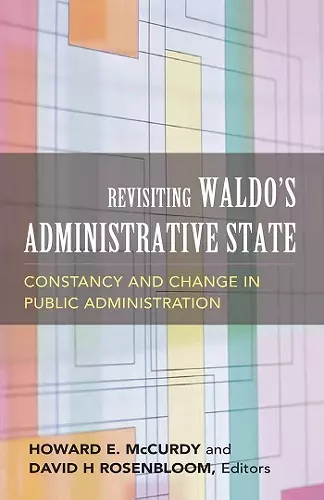Revisiting Waldo's Administrative State
Constancy and Change in Public Administration
Howard E McCurdy editor David H Rosenbloom editor
Format:Paperback
Publisher:Georgetown University Press
Published:22nd May '06
Currently unavailable, our supplier has not provided us a restock date

Revisiting Waldo's Administrative State contributes to the theoretical development of public administration because as its subtitle suggests, it aims to update one of the most significant contributions to administrative sciences in the 20th century, Dwight Waldo's The Administrative State (1948). This book will be useful to either introductory MPA or PhD level students in government, public affairs, or public administration because it fills an apparent void in existing academic literature. -- Richard Stillman, editor-in-chief, Public Administration Review, Graduate School of Public Affairs, University of Colorado-Denver This fascinating book updates Dwight Waldo's enduring insights with in-depth reflections about contemporary public administration by the best thinkers in the field today. It is a 'must read' for anyone serious about public administration scholarship. -- Rosemary O'Leary, Distinguished Professor, The Maxwell School of Syracuse University Revisiting Waldo's Administrative State underscores the importance of constitutional values for public administrative theory and practice. By revisiting, reflecting and carrying forward to the present the major themes of Dwight Waldo's classic text, the contributors have demonstrated that The Administrative State too is a 'living document.'. -- Christine M. Reed, professor, School of Public Administration, University of Nebraska at Omaha
Explores public administration's ideas and issues and questions whether contemporary efforts to "reinvent government", promote privatization, and develops public management approaches that constitute a coherent political theory capable of meeting the challenges of governing in a democracy.The prevailing notion that the best government is achieved through principles of management and business practices is hardly new - it echoes the early twentieth-century "gospel of efficiency" challenged by Dwight Waldo in 1948 in his path-breaking book, "The Administrative State". Asking, "Efficiency for what?", Waldo warned that public administrative efficiency must be backed by a framework of consciously held democratic values. "Revisiting Waldo's Administrative State" brings together a group of distinguished authors who critically explore public administration's big ideas and issues and question whether contemporary efforts to "reinvent government", promote privatization, and develop new public management approaches constitute a coherent political theory capable of meeting the complex challenges of governing in a democracy. Taking Waldo's book as a starting point, the authors revisit and update his key concepts and consider their applicability for today. The book follows Waldo's conceptual structure, first probing the material and ideological background of modern public administration, problems of political philosophy, and finally particular challenges inherent in contemporary administrative reform. It concludes with a look ahead to "wicked" policy problems - such as terrorism, global warming, and ecological threats - whose scope is so global and complex that they will defy any existing administrative structures and values. Calling for a return to conscious consideration of democratic accountability, fairness, justice, and transparency in government, the book's conclusion assesses the future direction of public administrative thought. This book can stand alone as a commentary on reconciling democratic values and governance today or as a companion when reading Waldo's classic volume.
The book's major strength lies in its application of public administration theories to tomorrow's social problems that we, as a planetary society, have not widely discussed ... [it] advances Waldo's work into the twenty-first century and serves as an excellent graduate text in public administration theory or as a supplement in an introductory course. Political Studies Review
- Winner of Co-winner of the American Society for Public Administration, Section on Public Administration Research's best book award (United States).
- Winner of Best Book Award 6 (United States)
- Winner of Public Administration Section: Herbert A. Simon Book Award (United States).
ISBN: 9781589010932
Dimensions: unknown
Weight: 386g
248 pages